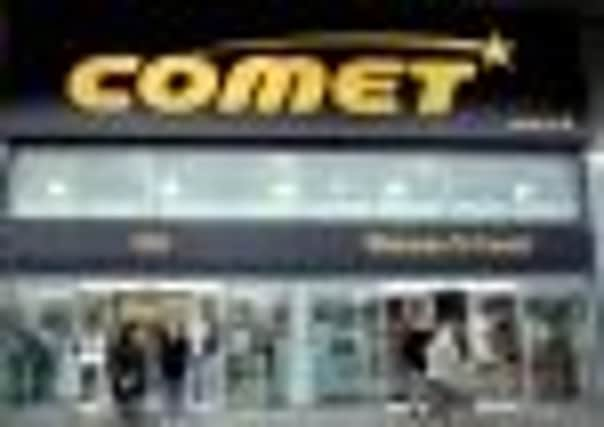More jobs to go as Comet sales slide


The Hull-based retailer, which has 248 outlets in the UK, will also shut one of its three warehouses and axe 12 of its 14 regional service centres, which are used as a base by its engineers who repair and service its products.
With Comet closing between five and 10 stores this year, Kesa said it expects to make 150 redundancies in the UK, including 40 recent job cuts at Comet’s head offices in Hull and Rickmansworth in Hertfordshire.
Advertisement
Hide AdAdvertisement
Hide AdSame-store sales at Comet declined by 15.2% in the 12 weeks to April 30 and are now down 7.7% over the past year as the retailer struggled in difficult market conditions following January’s increase in VAT to 20%. Online sales in the UK reduced by 8%.
Kesa warned earlier this year that Comet will make a loss this year after trade was disrupted by snow in the run-up to Christmas.
Kate Calvert, an analyst at Seymour Pierce stockbrokers, described the latest UK sales performance as “shocking”.
The company said it was likely that the warehouse to close would be in Corby, Northamptonshire, although this is subject to consultation.
Advertisement
Hide AdAdvertisement
Hide AdKesa’s business in France, where it trades as Darty, saw a 5% rise in same-store sales in the final quarter of the financial year but this was offset by struggling markets such as the UK and Spain.
Overall like-for-like sales were down 3.1% in the period, which was slightly better than the City’s expectations of a fall of 5%.
Shares rose 1% as traders reacted to the smaller than expected sales slump and the restructuring plans.
But David Jeary, an analyst at Investec, said: “There is little to cheer in our view in the latest trading update.
Advertisement
Hide AdAdvertisement
Hide Ad“For those of an optimistic bent, the proposed restructuring costs are set to deliver a meaningful level of cost savings - in the case of Comet and Spain, they urgently need to.
“We believe Kesa has arguably been tardy in addressing the cost- base issue.”